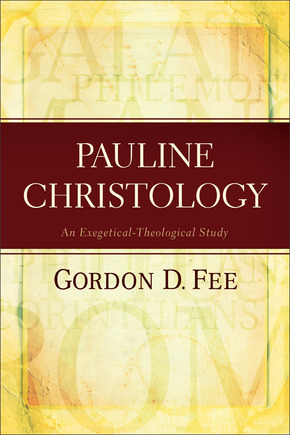Gordon Fee: Pauline Christology
 Gordon D. Fee, Pauline Christology: An Exegetical-Theological Study (Peabody, MA: Hendrickson, 2007), 707 pages, ISBN 9781598560350.
Gordon D. Fee, Pauline Christology: An Exegetical-Theological Study (Peabody, MA: Hendrickson, 2007), 707 pages, ISBN 9781598560350.
Gordon D. Fee, Professor Emeritus of New Testament Studies at Regent College in Vancouver, and noted Pauline scholar, offers exhaustive coverage of Pauline Christology in this book. Readers of the Pneuma Review need to be aware that Fee is unabashedly Pentecostal, the Spirit holding a central place in his studies, having already released his compendium volume regarding the Spirit within the Pauline corpus (God’s Empowering Presence: The Holy Spirit in the Letters of Paul, 1994). Seemingly rejecting a narrative approach to Paul’s Christology, Fee opts for the combination of exegetical analysis of passages and a theological synthesis of the materials; the same structure as his earlier work on the Spirit in Paul. Ascribing all of the traditionally credited books to the authorship of Paul, Fee descriptively details each book and its Christological content individually for the better part of 450 pages (10 chapters), and then offers a constructive synthesis of the data as it relates Paul’s distinctive Christology. I note the expansive exegesis so as to highlight the fact that Fee does not lightly hold the Biblical writ, but bases his understanding of Pauline Christology on it, and not upon conjecture (Pneuma Review readers would do well to read his practical guide, How to Read the Bible for All Its Worth). Fee’s constructive synthesis provides the following themes: 1) that Christ is the Divine Savior, 2) that Jesus is the Second Adam, effectively undoing what the first Adam did, 3) and that Jesus is both the Son of God and the exalted Lord of heaven and earth. In so doing, Fee demonstrates that Paul possesses a very high view of Christology. Fee consistently shows that Paul is unequivocal in his declaration that Jesus of Nazareth is both God and man at one and the same time. This is supported strongly within Paul by the ease with which he transitions between speaking of the Spirit of God and the Spirit of Christ, hence equating the two. Pneuma Review readers will value the attention to detail, along with the various chapter appendices serving as compendia of the relevant passages.
Fee is clear: Jesus is an object of worship, to whom Paul is completely devoted. May we be likewise.
Reviewed by Bradford McCall
Publisher’s page: http://bakerpublishinggroup.com/books/pauline-christology/334413
Category: Biblical Studies, Spring 2008


